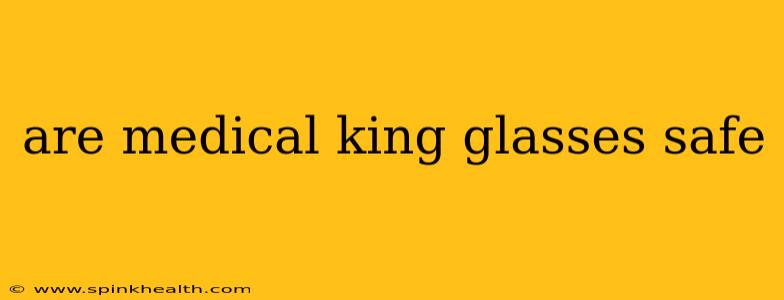The allure of sleek, stylish blue light glasses is undeniable. But when it comes to protecting your eyes, especially with brands like "Medical King," a healthy dose of skepticism is warranted. Are these glasses truly safe? Let's dive into the details, exploring the science behind blue light, the claims made by various blue light glasses brands, and what you should consider before purchasing.
My journey into the world of blue light glasses started with a simple question: Are these trendy glasses really necessary? The answer, as you'll soon see, isn't a simple yes or no.
What is Blue Light, and Why the Concern?
Our digital world bathes us in blue light – that high-energy visible light emitted from screens like smartphones, computers, and televisions. While some blue light is beneficial, regulating our circadian rhythm, excessive exposure has been linked to potential issues like eye strain, headaches, sleep disruption, and possibly even long-term eye damage, though more research is needed on the latter.
Do Medical King Glasses Actually Protect My Eyes?
This is the million-dollar question. Many brands, including those with names like "Medical King," make bold claims about their blue light glasses' protective capabilities. However, the effectiveness hinges on several factors:
-
The quality of the lenses: Are they actually filtering blue light effectively? Independent testing is crucial, but rarely provided by these brands. Look for brands that offer detailed specifications about the percentage of blue light blocked and the wavelengths affected.
-
The marketing hype: Many brands exaggerate the benefits. While blue light glasses might reduce eye strain in some individuals, they are not a cure-all for digital eye fatigue. If you have pre-existing eye conditions, always consult an ophthalmologist.
-
The price: Be wary of extraordinarily cheap glasses. The quality of the lenses, and therefore their effectiveness, may be compromised.
What are the Potential Risks of Wearing Blue Light Glasses?
While generally considered safe, certain potential risks exist:
-
False sense of security: Over-reliance on blue light glasses might lead people to spend even more time on screens, negating the benefits of the glasses.
-
Poor quality lenses: Cheap, poorly made lenses might actually distort vision or cause discomfort.
-
No substitute for good eye care: Blue light glasses are not a replacement for regular eye exams or addressing underlying eye health concerns.
How Can I Choose Safe Blue Light Glasses?
Choosing safe and effective blue light glasses requires careful consideration:
-
Consult your eye doctor: This is the best way to determine if blue light glasses are right for you, and what level of protection you might need.
-
Look for independent testing: Check for third-party verification of the blue light blocking capabilities of the glasses.
-
Read reviews carefully: See what other customers have experienced with a particular brand.
-
Choose reputable brands: Opt for brands with established reputations in the eyewear industry.
Are there other ways to protect my eyes from blue light?
Absolutely! Beyond blue light glasses, consider these strategies:
-
The 20-20-20 rule: Every 20 minutes, look at something 20 feet away for 20 seconds.
-
Adjust screen brightness: Reduce the brightness of your screens, especially at night.
-
Use a blue light filter on your devices: Many devices offer built-in blue light filters.
What if my eyes are already damaged?
If you have existing eye problems, blue light glasses should not be considered a treatment. It's crucial to consult an ophthalmologist for proper diagnosis and treatment.
In conclusion, the safety of "Medical King" glasses, or any blue light glasses for that matter, depends largely on their quality and your individual needs. Prioritize a comprehensive approach to digital eye health, involving responsible screen time management and consultation with an eye care professional. Don't let marketing hype cloud your judgment; informed choices are key to protecting your precious eyesight.

